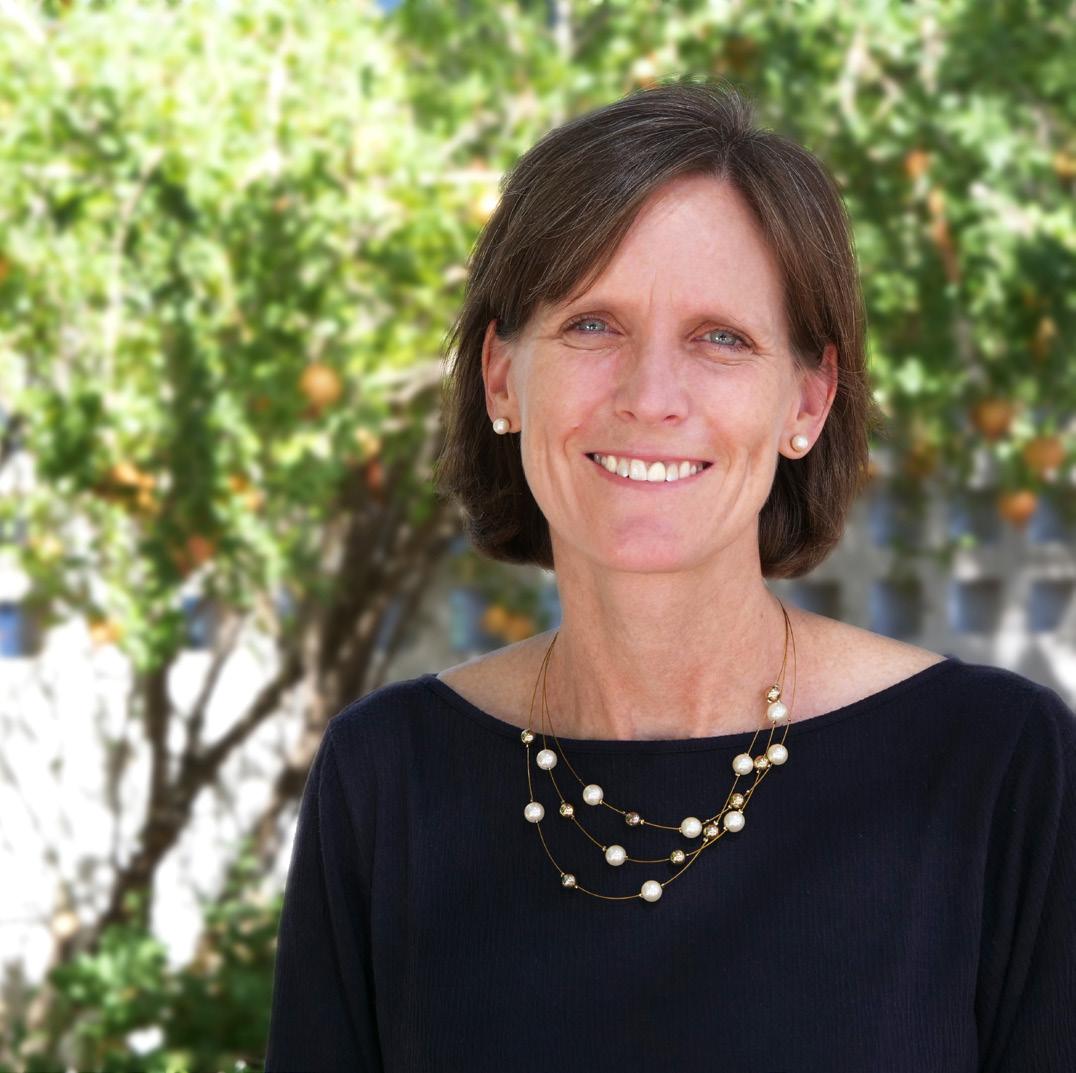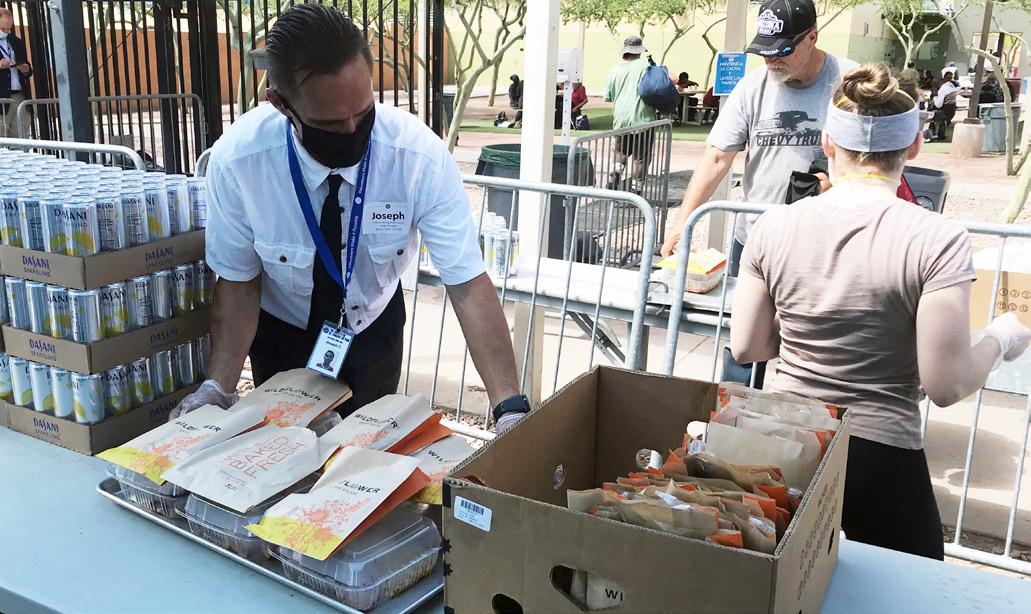
8 minute read
EDITOR’S NOTE
{on the job} STORIES OF HOPE
The COVID-19 pandemic has caused unprecedented challenges for the nonprofit sector. We’re seeing shortterm effects now — lost revenue from canceled events, entry fees and performances, diminished donations as well as reduced staff and volunteer availability. The lack of cash flow makes it hard for nonprofits to keep going, and in many cases it’s made worse by higher expenses and more demand for services. We’ve never lived through a time like this before.
But amid the challenges, there are stories of hope and incredible examples of nonprofits making a tangible difference. That’s why Frontdoors has partnered with Virginia G. Piper Charitable Trust on this special issue to highlight our community coming together and the importance of that.
Piper Trust was founded by Virginia Galvin Piper, a humble woman who grew up in the Midwest, with strong Midwestern values. In this trying time, Virginia can be a source of inspiration. She survived a pandemic, worked hard through the Great Depression and knew what it meant to take care of her neighbors. In 1945, Virginia married Paul Galvin, the founder of Motorola. While he was a successful business leader, he was also a generous philanthropist and he shared those values with Virginia — values that became part of her mission. As she graciously said, “We all have an opportunity to do ‘good things’ on a daily basis for others and to do them in an unselfish manner; to provide our world and its people, through giving, an improved beautiful culture and places to live, work and grow healthy families.”
Today, more than 20 years after Virginia’s death, Piper Trust continues her legacy to enhance health, wellbeing, and opportunity in Maricopa County. And in this moment, the Trust has worked in coordination with philanthropic partners and state leaders to restore balance and ease anxiety caused by COVID-19.
“My colleagues and partners in Arizona philanthropy and I believe it’s best to try to find our way through this together rather than go it alone,” said Mary Jane Rynd, president and CEO of Virginia G. Piper Charitable Trust. “Now is the time for those who can — individuals and public and private sector organizations — to step in quickly and support our nonprofits.” to the crisis. They had five virtual board meetings within a month and, to date, have awarded more than $9 million in emergency grants to nonprofits that are so vitally important to our state’s health and economic vitality.
ASU’s Biodesign Institute received a $2 million grant from the Trust for innovative work to help mitigate the effects of the pandemic. Dr. Joshua LaBaer, director of the Institute, is the first Virginia G. Piper Chair of Personalized Medicine at ASU. The Trust knows him well and has great confidence in him. In rapid speed, LaBaer and his team took lab space and equipment they already had and converted it to do COVID-19 testing and, with the purchase of a few additional pieces of equipment, have already manufactured thousands of test kits — including those hard-to-get swabs — and are on track to deliver thousands more.
But that’s just one story of innovation and resilience. This issue of Frontdoors highlights several organizations Piper Trust is supporting at this difficult time. In them, we think you’ll see a spirit of resourcefulness, creativity and drive — nonprofits figuring out new and more efficient forms of service delivery.
This pandemic has brought harsh realities and is testing us all. But we are optimistic that the crisis will strengthen our community in unimagined ways, deepen our resilience, and open our eyes and hearts to the well-being of others. And while we all wait to get there, we offer this issue as a way to share hope at a time when we really need it.
Read the story of Virginia’s life and legacy, “Devotedly, Virginia” at
pipertrust.org/VirginiaPiperBiography.
Karen Werner EDITOR


Portraiture - Events - Commercial Photography
602.677.3985 MarionRhoadesPhotography.com
602.253.8188 www.VYT.com
Invest in the Future of VYT! For every $100 you invest in VYT, we will provide you with one ticket to each of our next six productions! For a limited time only. Please visit our website to participate.


*All dates subject to change.
2 5 t h Y e a r !
A Phoenix Family Tradition




October 9-25, 2020
August 14-30, 2020

April 2-18, 2021



December 4-23, 2020
B a c k b y p o p u l a r d e m a n d
June 11-27, 2021

{fascinating people}
SHANNON CLANCY

Associate executive director of St. Vincent de Paul
1. St. Vincent de Paul provides comprehensive services. Can you describe its operations around the Valley? St. Vincent de Paul works to feed, clothe, house and heal people in need across the Valley while providing community members the opportunity to serve. We offer direct support services to homeless and low-income individuals and families through personal, meaningful interactions that recognize the dignity and value of each person.
Our service programs include five charity dining rooms; a neighborhood network of more than 80 food pantries; a resource center for people experiencing or at risk of homelessness that includes rent and utility assistance; transitional housing for veterans and older adults; medical and dental care for uninsured patients; three urban farms that grow fresh produce as a sustainable food source for our dining rooms; and community thrift stores. To accomplish all of this, we work with thousands of volunteers each year, who we connect with service opportunities that bring joy and purpose while uplifting the community.
2. How many people do you serve in a typical day, and how has that number changed since the COVID-19 crisis hit? We serve thousands of people every day across our programs, particularly through the meals we serve in our charity dining rooms and the home visits and food box deliveries that our volunteers make in neighborhoods across central and northern Arizona.
We are definitely seeing increased need since the crisis began. Our community food pantries are receiving more requests for food support, and we’ve started to send extra food allotments in advance of their regular supply. One month’s worth of food has nearly doubled to keep up with the increased demand.
We are also seeing increased requests for rent and utility assistance as families struggle to pay bills after losing their jobs or facing decreased work hours. While our state’s eviction moratorium is important, as it keeps people in their homes during this health crisis, they still owe those payments and will need additional support over the summer months to prevent homelessness in the near future.
3. What additional services are you managing these days? We provide critical support and services to those in our community who have nowhere else to turn for help. So it isn’t that the COVID-19 outbreak has called for us to add services as much as it has called on us to continue the work we do in the face of all of the challenges this pandemic has presented. This unprecedented emergency requires a significant shift in our service model from “social embracing” through face-toface assistance to “social distancing,” where we continue to meet basic needs while also protecting the health of our guests, volunteers, staff and the collective community.
We are highly aware that we must work hard to protect those experiencing homelessness from the spread of the coronavirus, as they are vulnerable in their inability to isolate without a home. Currently, we are offering to-go, pre-packaged meals at our dining rooms; take-home activity kits for children through our educational program for at-risk youth; fresh produce from our farms to supplement takehome meals; telemedicine out of our medical clinic; utility and rent assistance to prevent homelessness; hygiene items/food/counseling for those experiencing homelessness; and transitional shelter for veterans, disabled and/or older adults.
4. How many volunteers and providers does it take to cook all of the meals, and how does it go out? Typically thousands of volunteers would help us in our kitchen each year, but we have asked them to remain home for their health and safety and the health and safety of the community. Currently, front-line staff and redeployed staff rotate through shifts to prepare the thousands of “to-go” meals we serve out of our dining rooms each day.
We’re grateful to our local restaurant partners, from whom we purchase thousands of pre-packaged meals each week to feed our food-insecure guests. These partnerships have been a win-win. They help keep St. Vincent de Paul’s to-go meal model viable so we can continue providing meals to people who need them while also supporting local businesses and their employees during a difficult time.
5. St. Vincent de Paul has an army of devoted volunteers. How has your volunteer pool been affected? Because of social distancing, stay-at-home policies and our need to keep our volunteers, staff and guests safe, we have asked all of our volunteers to stay home for now. This has been very difficult for all of us, as our typical model seeks to embrace and involve people at scale.
Yet, we have been so grateful for the response from our community to help through their financial and inkind donations, their purchase of much-needed items off of our Amazon Wishlist and their participation in the “Helping from Home” volunteer activities, such as making cloth face masks for our staff, shelter residents and guests experiencing homelessness or creating “blessing cards” to place into the sack lunches that we distribute to our dining rooms.












